|
|
|
Sort Order |
|
|
|
Items / Page
|
|
|
|
|
|
|
| Srl | Item |
| 1 |
ID:
188312
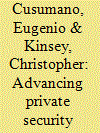

|
|
|
|
|
| Summary/Abstract |
On the 20 March 2003, George W. Bush launched Operation ‘Iraqi Freedom’. At the time, it was unlikely anyone in his administration envisaged that United States (US) troops would eventually rely on the largest force of private military contractors in recent times. Victory over Saddam Hussein and the ensuing occupation and reconstruction of Iraq would have not happened without the support of military contractors working behind the scenes to ensure that combat troops receive adequate supplies, maintain vehicles and equipment, and protect military bases and convoys. In Afghanistan, the US and the other countries participating in the North Atlantic Treaty Organization (NATO) International Security Assistance Force mission relied on contractors providing logistics and armed security to an even larger extent. The NATO-trained Afghan military itself inherited US dependence on contractors, whose departure from Afghanistan alongside American soldiers was identified as one of the factors underlying Kabul armed forces’ inability to confront the Taliban’s advance.
|
|
|
|
|
|
|
|
|
|
|
|
|
|
|
|
| 2 |
ID:
178661


|
|
|
|
|
| Summary/Abstract |
In the context of an increased use of commercial soldiers in high-end conflict, this article investigates how the Nigerian government's reliance on the global market for force has helped its efforts to counter Boko Haram. The article shows, through a case study of Nigeria's counterinsurgency campaign against jihadist insurgents, that states in the developing world can augment their ability to provide effective public security by creating security assemblages. Moving beyond the normative debate about Private Military Companies (PMCs), this article highlights that public-private security arrangements can support the state in the developing world to live up to its role as a communal security provider. Nigeria's employment of the South African PMC Special Tasks, Training, Equipment and Protection Ltd. (STTEP), helped it build an effective public-commercial partnership, thus providing the Nigerian Armed Forces (NAF) with capacity, capability and norms that were essential in their counterinsurgency struggle.
|
|
|
|
|
|
|
|
|
|
|
|
|
|
|
|
| 3 |
ID:
141165
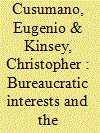

|
|
|
|
|
| Summary/Abstract |
In spite of its sensitivity, diplomatic protection has received very sporadic scholarly attention. This article provides a comparative analysis of US and UK diplomatic security policies, focusing on the increasing use of private military and security companies (PMSCs) for the protection of foreign service and development agencies’ personnel. The existing theoretical explanations of the privatization of security tasks cannot explain why countries displaying similar material incentives and similar political and market cultures have outsourced diplomatic protection to different degrees, nor can they account for variance in the use of PMSCs by different agencies within the same country. Our analysis highlights the importance of investigating organizations’ interests in providing a more accurate explanation of the varying propensity to outsource armed protection. In both the United States and the United Kingdom, the outsourcing of diplomatic security was a resultant of foreign policy bureaucracies and military organizations’ preferences.
|
|
|
|
|
|
|
|
|
|
|
|
|
|
|
|
| 4 |
ID:
188325
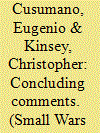

|
|
|
| 5 |
ID:
062634
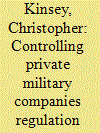

|
|
|
| 6 |
ID:
081062
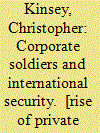

|
|
|
|
|
| Publication |
London, Routledge, 2006.
|
| Description |
xi, 196p.
|
| Series |
Contemporary security studies
|
| Standard Number |
9780415365833
|
|
|
|
|
|
|
|
|
|
|
|
Copies: C:1/I:0,R:0,Q:0
Circulation
| Accession# | Call# | Current Location | Status | Policy | Location |
| 053119 | 355.354/KIN 053119 | Main | On Shelf | General | |
|
|
|
|
| 7 |
ID:
067022
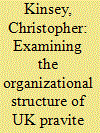

|
|
|
| 8 |
ID:
192604
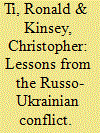

|
|
|
|
|
| Summary/Abstract |
A commonly held view amongst strategists is that strategy leads logistics, and that military logistics, which is the science of sustainment and replenishment, is generally subordinate. The authors of this article contend that in fact the opposite is often true, that logistics frequently has primacy over strategy, and that it is the success or failure of logistics at lower levels of war which exerts the greater effect. The authors illustrate their arguments on this nexus between logistics and strategy, with examples from the current Russo-Ukrainian conflict highlighting how Russian logistic failures have contributed to failure of the strategic plan.
|
|
|
|
|
|
|
|
|
|
|
|
|
|
|
|
| 9 |
ID:
082138
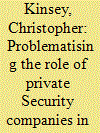

|
|
|
|
|
| Publication |
2007.
|
| Summary/Abstract |
This article sets out to investigate the impact of Private Security Companies (PSCs)1 on civil wars. In doing so, it has taken an historical line, outlining the way the industry has developed from when it first emerged on the international stage in the late 1960s, to the present. Importantly, the article is able to identify three broad strands of involvement in civil wars that include substituting for state military forces, propping up weak governments, and supplementing state militaries. Moreover, in each of these situations, the involvement of PSCs raises both moral and legal questions, as well as challenges for government. This is especially so in light of their activities in Iraq and Afghanistan and the likelihood that governments will increasingly turn to them for niche capabilities.
|
|
|
|
|
|
|
|
|
|
|
|
|
|
|
|
| 10 |
ID:
189726


|
|
|
|
|
| Summary/Abstract |
In December 2021, the International Code of Conduct for Private Security Service Providers’ Association (ICoCA) changed the definition of security services, expanding its scope and undertaking roles that include direct participation in hostilities. Christopher Kinsey and Christopher Mayer argue that, in promoting this broadened scope, the ICoCA did so without first identifying important principles and standards relevant to those new functions. Critically for the international order, the unintended consequences of these changes could be far reaching, legitimising quasi-mercenary organisations and fighting in combat.
|
|
|
|
|
|
|
|
|
|
|
|
|
|
|
|
| 11 |
ID:
136443
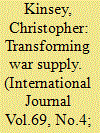

|
|
|
|
|
| Summary/Abstract |
Since the end of the Cold War, policymakers and academics alike have examined in great detail every aspect of military operations apart from military contracting. This article surveys key issues that confront United Kingdom (UK) policymakers. It engages with and updates the secondary sources to explain the evolution, role, and implications of military outsourcing for UK overseas operations in the twenty-first century. It explores the politics, rationale, and consequences of outsourcing technical and support services to expeditionary operations. This article provides a framework for a discussion that is becoming increasingly urgent given the UK military's increasing dependence on military contractors to generate fighting and support capabilities on operations. It proceeds in two steps. First, it traces the evolution of military contracting, identifying the different political and economic drivers behind the decision to engage technical and support contractors on operations. Second, it discusses the future implications for the UK military of this decision
|
|
|
|
|
|
|
|
|
|
|
|
|
|
|
|
|
|
|
|
|